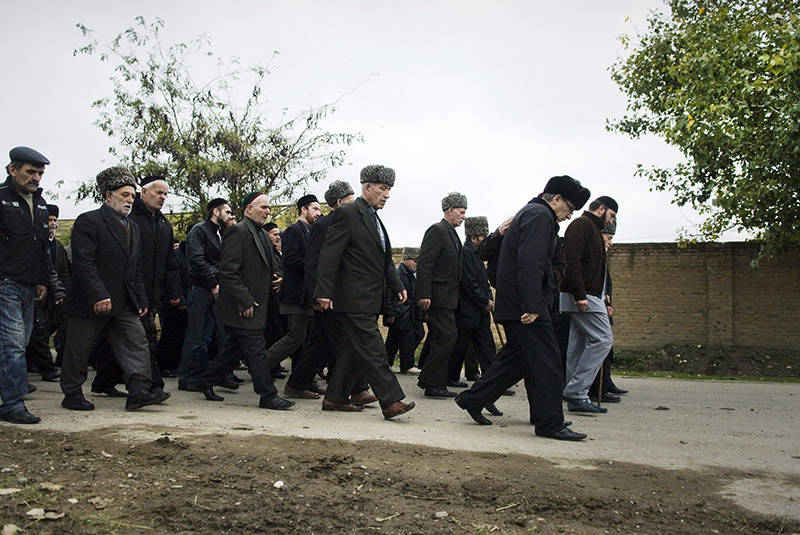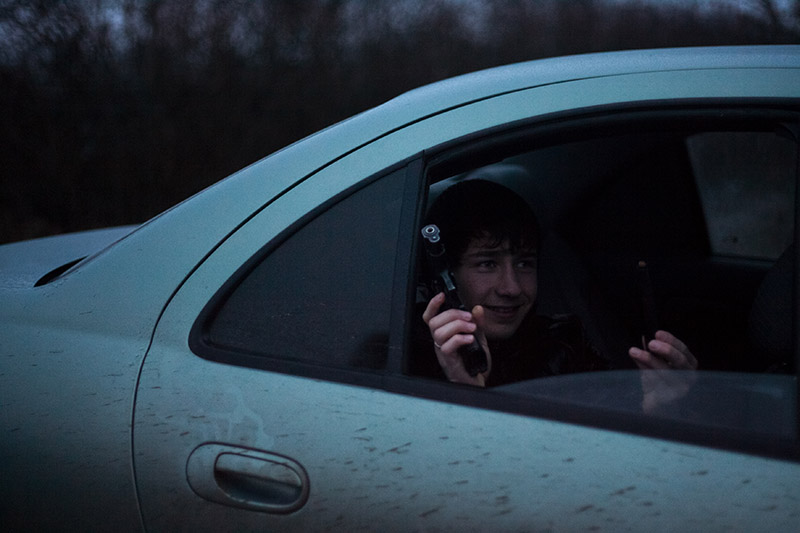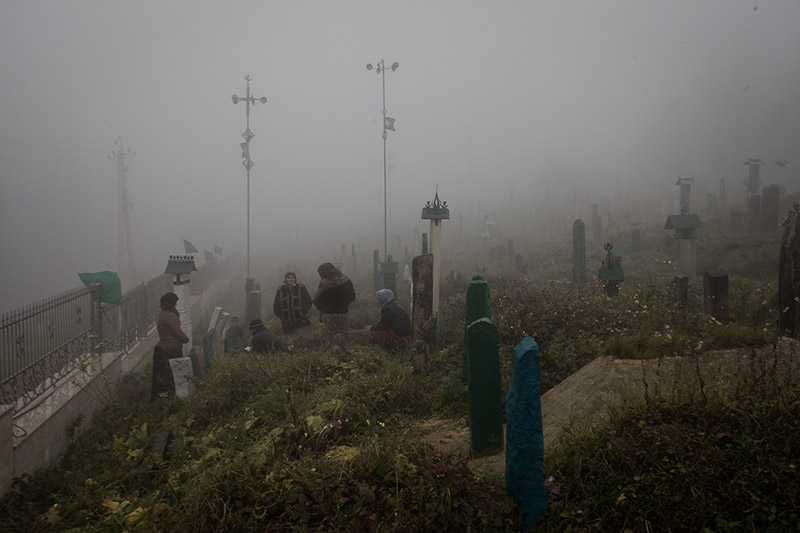We are in a coffee house with four young men. The youngest is about 24, the eldest 34. They are friends; they are into sports and car rallies. One of them has a car with the letters KRA on the license plate [an abbreviation of Kadyrov Ramzan Akhmatovich, the full name of the Chechen leader, and a sign of membership of the inner circles of power]. He is the least talkative of the four. The eldest one speaks more than the others, who add something occasionally. The intimacy of this interview is the result of an agreement that all concerned would remain anonymous.
A father who respects his child would never hit him, otherwise it would mean that he has no respect for himself. When you’ve done wrong, and your father or both your parents learn about it, they just give you a look and say nothing. And you wish they’d actually hit you. But they just remain silent, and that’s the worst thing in the world.
A woman mustn’t make decisions. One mistake made by a woman is a taint on the current generation as well as on the previous one. And it is only generations later that the mistake may be forgotten. So in an attempt to avoid that one mistake, a man lives in constant worry.
For example, Islam teaches us: “Love thy mother, respect her, worship her, but remember that she is also a woman.”
Say I have a sister, she’s ten years older than me, and yet she must at all times obey her brother. You know, how dates happen here: the two are standing a meter or two apart from each other, and that’s a date. The girl must not agree on a meeting place for a date if there is even a small chance that a brother or cousin of hers may pass by. Maybe he goes there just once a month, yet she can't risk being there if there is any chance of being seen by a male family member. This respect for men is something that is instilled in our women from childhood.
For instance, there’s a friend of mine and he is seven or eight years younger than me. I have absolutely no clue whether he smokes or not, whether he drinks alcohol or not, even though we spend lots of time together at the same club. I don’t even know whether he’s got a girlfriend. That’s because I’m older than him.
The crux of the matter is that you cannot respect traditions if you don’t know them. We’ve been having military actions here for fifteen years. And that period, you see, was not good for culture, for keeping traditions and customs alive. People were just trying to survive, like in the wild. Now things are starting to get back to normal, so to speak. You can keep the traditions that your ancestors kept. Sure, we would also like to socialize with our sons, go out and playing soccer with them, but that is unacceptable here.
It’s hard to understand us. There’s love towards one’s children. But we must keep the traditions. Why? Because otherwise - the very same child will eventually start talking back to you. He’ll go against his father, his mother, and his brother. That’s how it works. You reap what you sow.
Don’t you feel some sort of pressure, being the eldest brother and carrying responsibility for a big number of people?
I wouldn’t call it ‘pressure’. It’s considered a duty. We don’t have orphanages or homes for the elderly. I’d feel disgraced at the mere thought that I might give a member of my clan over to a home. I don’t even know how to explain all this. It’s as if something’s been instilled in us, as it were, at a genetic level.
Say a lad of 16 lost his father. But he still has his mother left, and his siblings. So this boy automatically has to abandon his childhood. He abandons his games and his buddies. He becomes no less than the head of the family.
What kind of childhood did I have? I hardly had any childhood before the war. Look, I finished five grades more or less okay, and afterwards we got Dudayev’s [Dzhokhar Dudayev was elected President of independent Chechnya on November 9, 1991] regime. We didn’t have normal schools, you see. There was no childhood. I was 17 when I had to collect small bits of human flesh. And what kind of childhood can one have after that? We saw how a helicopter bombed a house, with a whole family inside. So we were collecting pieces of those six people, to bury them. But what kind of childhood can one have after that?
And virtually every family has been through something like that. Things would go smoothly till you reach 5th or 6th grade, and then… you understand, don’t you, then… Sure, it would be a rough comparison. Just like any explosion at an airport, or, if you will excuse me, Beslan [the Beslan school siege, the hostage crisis in the small town of Beslan in North Ossetia that resulted in the deaths of 380 people out of the 1,100 who were hostages. Many people believe that the Kremlin handled the crisis very badly, and some even claim that it was the Kremlin that ordered the Islamic militants to do it]. So those “Beslans” and airport explosions – we were having them day and night, all the time. After Beslan, people needed psychological help and rehab centers and recuperative trips. And we’ve seen those horrors every day and every night for… how long? The first war lasted three-four years, just like the second one. So, for eight years. And the time between the two wars was even more horrifying than the wars themselves.
By the 6th grade I already had a gun under my shirt when I went to school. It was normal. And any man older than that – if he didn’t have either a gun or a rifle, or if he’s got a car full of papers – nobody would consider him a real man. How come he’s walking around with papers? So we got our childhood back only about ten years ago. For instance, I’m still unable to leave my childhood behind. I still play with toys and I see nothing wrong with that.
Very little time has passed since the end of the war and one has to change so drastically that today you have to behave differently, what’s the word, properly maybe.
Have you managed to get over all this?
Did I have a choice? Does one have a choice? None whatsoever, and not only in the psychological sense. In general, I had no place to go. In 2000 I lived in Grozny. I could drop by any apartment where people had their lights on, and I could spend the night there or just have shelter for a while. Because if you get kicked out into the streets, that’s the end. You can count yourself done. So the people became united because of the war, just like any other nation would. And since then we’ve been recovering little by little.
Is your recovery going well?
It’s going quite well. It’s going splendidly, actually, even though I… in general… Well, there was a lot going on around me… Yet, I’ve managed anyway. I wouldn’t say that the war has spoilt me… I’ve no right to say so, I think. Because I’m perfectly healthy, I’m mentally well, my head works okay. The only thing is that I lack knowledge. I couldn’t get knowledge in school since there were no schools. It’s necessary to control the consequences, the remnants of what’s left of your soul. For example, at the time of the first war I was a teenager. I was ready to simply bite anybody’s throat out because of the politics, because of all the things I was seeing every day. But after the war our own government automatically set me straight. At the end of 2003 and 2004 we’d attend athletic competitions in various parts of Russia. And the attitude was, you know, somewhat strange. That is, we felt their fear and mistrust towards us, and felt not a bit of pity. Those people who were in Nord-Ost [The Moscow theatre hostage crisis of 2002, when on October 23rd Chechen militants took 850 hostages during a theatrical performance of the musical 'Nord-Ost'. The siege ended with special forces pumping an unknown chemical agent into the building and then raiding it. The total number of deaths was around 170], they are victims to this very day.
But why do they regard us in this way? I’ve always wanted to understand. People told me that even when the journalists came over and showed how in one village everybody was killed except for one little boy, because one Russian soldier felt sorry for him and shot in the air and left him alive, they had no pity for Chechens. In that same village they burnt another baby in the cradle where he lay. Burnt him. What had he done to them? Why is it that nobody feels pity for us? Why this attitude? “Those Chechens.” Yes, we are Chechens, so what? So what?
I have many answers. When in the 1990s we’d constantly watch those videos of how the Chechens were killing Russians, cutting their throats, then you’d never…
Here we go. Wait a second. But how did it all begin? That settlement, Samashki: half of the people got stabbed to death, the other half raped. And they videotaped all this, and the copies of the cassettes were being sold in all kiosks and markets. That was the beginning.
That was the edge, you see? When they showed how a father is forced to witness his daughter being raped, or how they hold a pregnant woman by the hair, cut her belly open, and the fetus falls out and they pour solar oil inside her and she’s hanging like a candle while the Special Forces guys are sitting and having their meal. They would show this in public, spread it on purpose, so that people would kill those soldiers. Now tell me that I’m wrong. First they showed us that settlement. It was clearly a punitive operation. There were no commandos there. There was only one missile unit.
Take Budanov, for instance [Yuri Budanov was a high-ranking Russian officer, one of the few convicted by a court of kidnapping and murdering a young Chechen girl, Elza Kungaeva. After being released on parole, he was shot dead]. He was sentenced to 8 years in jail for rape and murder. But the guy who supposedly killed Budanov – he got sentenced to 15 years, or at least they are trying to give him 15. For instance, some Russian officer, a son-in-law of some minister, got Chechen syndrome. But what does it mean “the Chechen syndrome”? He didn’t see the blood that he’d spilt or what? Or maybe there’s no such thing as Russian federal soldier syndrome? Of course, there is. Everybody’s got a syndrome.
But then again… there have been no apologies for the Deportation yet [More than 500,000 Chechens and Ingush were deported from Chechnya and Ingushetia to Kazakhstan on the orders of Joseph Stalin in 1944 and the survivors were only allowed to return in 1957.
The given reason for the deportation was that the government believed that some of the population had cooperated with the Nazis. In 2004, the European parliament classified this event as an act of genocide]. Even though we fought against the Nazis together… you know, what’s Russia’s problem? The first problem is that it has the wrong policy towards simple people. Because in Russia it’s this way: if you got money, then you are allowed to do anything. If you don’t have money, you are allowed to do nothing.



























